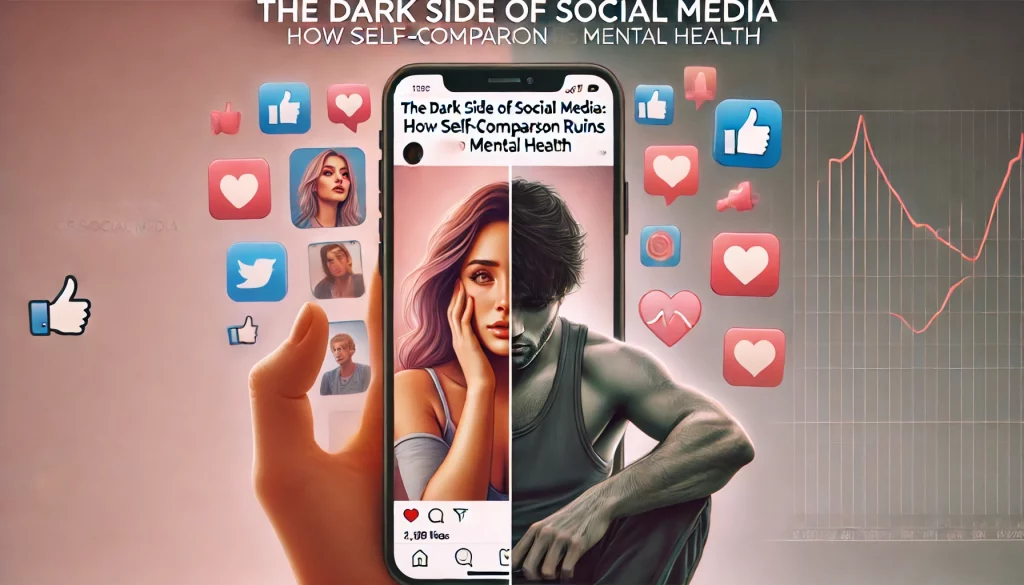
In the digital age, social media has become a pervasive aspect of everyday life, providing platforms for communication, self-expression, and information sharing. However, along with its benefits, social media has also introduced new challenges, particularly related to mental health. One of the most significant issues is self-comparison, a natural human tendency that can lead to severe psychological consequences when amplified by social media. This essay explores the nature of self-comparison, its theoretical underpinnings, manifestations in the digital age, and its impact on mental health, providing a comprehensive analysis suitable for a Ph.D.-level understanding.
Theoretical Foundations of Self-Comparison
The concept of self-comparison is deeply rooted in psychological theories, particularly Social Comparison Theory, developed by Leon Festinger in 1954. This theory posits that individuals have an inherent drive to evaluate their opinions and abilities by comparing themselves to others. Festinger identified two primary types of comparisons: upward and downward. Upward comparison involves comparing oneself to those perceived to be better off or more competent, which can inspire self-improvement but often results in feelings of inadequacy and low self-esteem. Conversely, downward comparison involves comparing oneself to those perceived to be worse off, which can boost self-esteem but may also lead to a sense of complacency and superiority.
Self-comparison serves several motivational functions. It aids in self-evaluation, allowing individuals to assess their own abilities and progress, informing personal goals and improvement strategies. It also supports self-enhancement, where favorable comparisons enhance self-esteem and provide a sense of validation. Additionally, observing others’ successes can motivate individuals to set higher goals and strive for personal growth.
However, self-comparison is influenced by several cognitive biases that can skew perceptions and exacerbate negative feelings. Confirmation bias, the tendency to seek out and focus on information that confirms existing beliefs or self-perceptions, can lead to skewed comparisons that reinforce insecurities. Negativity bias, the inclination to give more weight to negative experiences and information, can amplify the adverse effects of unfavorable comparisons.
Manifestations of Self-Comparison in the Digital Age
Social media platforms are uniquely structured to facilitate and amplify self-comparison. Users typically present an idealized version of their lives, showcasing highlights and achievements while omitting everyday struggles. This creates a distorted reality against which others measure their own lives. Features such as likes, comments, and shares provide immediate feedback on posted content, intensifying the pressure to conform to perceived social standards.
The always-on nature of social media ensures continuous exposure to others’ curated lives. Users are constantly bombarded with images and stories of others’ successes and happiness, providing endless opportunities for comparison. Social media connects individuals worldwide, increasing the diversity and number of people to compare oneself against, including celebrities and influencers with often unattainable lifestyles.
Social media algorithms play a critical role in shaping self-comparison behaviors. These algorithms tailor content to individual preferences and engagement patterns, often highlighting posts that evoke strong emotional reactions, such as envy or admiration. By repeatedly exposing users to similar types of content, algorithms can reinforce certain self-comparative patterns, creating a feedback loop that perpetuates negative self-evaluation.
Impact of Self-Comparison on Mental Health
Self-comparison on social media can lead to several adverse emotional and psychological outcomes. One significant consequence is lower self-esteem. Comparing oneself to idealized images and achievements of others can result in feelings of inadequacy and diminished self-worth. Additionally, the pressure to measure up to others’ lives can cause chronic stress, anxiety, and depression. The Fear of Missing Out (FOMO) further exacerbates these feelings, as individuals constantly feel they are missing out on better experiences.
Exposure to idealized body images on social media can lead to severe body dissatisfaction. Persistent comparison with digitally altered or selectively showcased bodies can contribute to body dysmorphic disorder, where individuals obsess over perceived physical flaws. In an attempt to emulate the perfect bodies seen online, individuals may engage in harmful behaviors such as extreme dieting, excessive exercise, or cosmetic surgeries.
Frequent self-comparison can significantly diminish overall life satisfaction and happiness. The constant exposure to others’ achievements and happiness can make one’s own life seem less fulfilling and successful. The relentless pursuit of an idealized lifestyle portrayed on social media can lead to a chronic sense of unhappiness and unfulfillment.
Mitigating the Negative Effects of Self-Comparison
Implementing mindful practices can help mitigate the harmful effects of self-comparison. Users should be mindful of the content they consume, focusing on accounts that promote positivity and self-acceptance while avoiding those that trigger negative comparisons. Limiting the time spent on social media can reduce exposure to potentially harmful content and alleviate the pressure of constant comparison.
Cognitive reframing techniques can help individuals manage the impact of self-comparison. Practicing positive self-talk and affirmations can counteract the negative thoughts that arise from self-comparison. Keeping a gratitude journal helps individuals focus on the positive aspects of their own lives, reducing the urge to compare with others.
Emphasizing personal growth over comparison can foster a healthier self-perception. Establishing personal goals that are achievable and not influenced by others’ lives can help individuals focus on their own progress. Acknowledging and celebrating one’s own successes, no matter how small, can reinforce a positive self-image.
Seeking professional help can provide additional tools and strategies for managing self-comparison. Professional therapists can offer guidance on managing negative self-comparison and improving mental health. Engaging with support groups can provide a sense of community and shared understanding, reducing feelings of isolation.
Conclusion
Self-comparison is a natural human behavior, but its amplification through social media can lead to significant mental health challenges. By understanding the theoretical foundations of self-comparison and its manifestations in the digital age, individuals can develop strategies to mitigate its negative effects. Through mindful social media use, cognitive reframing, a focus on personal growth, and professional support, it is possible to foster a healthier relationship with social media and improve overall well-being. Ultimately, true happiness and fulfillment come from within, not from how one’s life compares to others online.